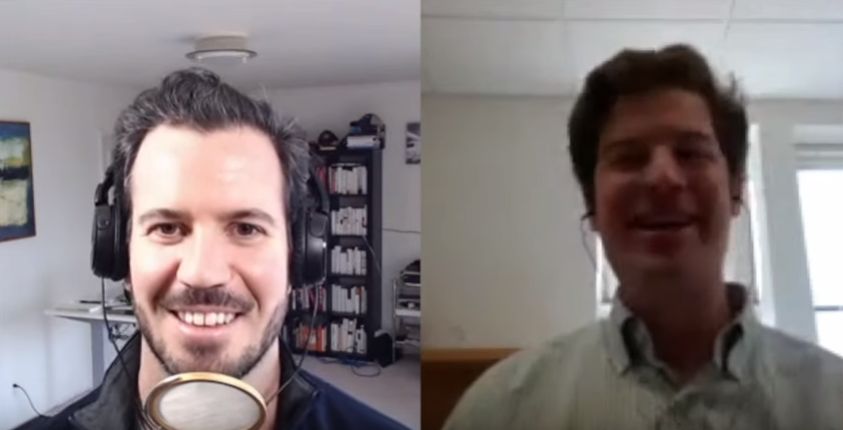https://www.youtube.com/watch?v=CT5DXNB3KKY?start=3120
In his recent interview with Tobias, Dan Rasmussen, who is the Founder and Portfolio Manager of Verdad Advisors provides some great insights into why investment decisions should be based on empirical data and not stories and emotions. Here’s an excerpt from the interview:
Dan Rasmussen: I talk to respective investors a lot, it’s part of my job. And the one question I dread the most, is when they say, “Tell us about some of the companies in your portfolio.” And I’m just like, “Oh no. And I’m like, the more you know about the companies, the less you’re gonna like the strategy. Just hold your nose, blindfold yourself, and buy. Because, do you really wanna know that the largest holding is a Russian steel company, or would you rather not have known that?”
Tobias Carlisle: There’s two reasons to hate it. It’s Russia and steel. That’s why it’s cheap.
Dan Rasmussen: Yeah that’s why it’s the cheapest darn thing in the world. But, it’s funny. I think that’s exactly why, and I think people make decisions so much more on stories and emotions than they make it based on data. And that’s what I think quantitative investors are fighting, right? Because someone’s gonna make a decision to invest in a stock or invest in a fund, based on an emotional or person connection. Not necessarily based on reason or that sort of, what Kahneman calls The Type two, or type logic. And I think that’s often a challenge we face, with being quant investors.
Dan Rasmussen: And that’s why I think work like what you’re doing, is so important, because we need to tell the story of why statistics work. We need to talk about things like the acquirers multiple, and say, “You know, if you actually walk through he intellectual journey, you’ll start to come to an emotional connection with this way of thinking. And if you come to an emotional connection with this way of thinking, then maybe you’ll act based on reason.” But you have to do so much work to overcome people’s bias, because it would be so much easier to walk in and say, “What I buy is great companies, the best companies in the world.” And you know, “Gee, it’s not just important to buy the best companies, you gotta know them better than anyone else.
So, we put more work and more money into understanding these great companies and why they’re great, than anyone else. And blah, blah, blah.” And that’s what so many people pitch, and by and large that’s where the money flows to those types of people, and to me it’s just crazy because it’s just not likely to work.
Tobias Carlisle: You have to find the good story to sort of explain the data you’re using, which is what I’ve tried to do in the books. Here’s the story that you can remember, but the real message is the underlying data that tells you how it works. But I’ve seen many examples, and I’m sure you have too, where there’s no limit to the amount of research that a firm can do. Big firms that have multiple analysts and can send them out.
And I know that, for example, I won’t mention the name of the firm, but a local firm in Los Angeles had a very big position in Sino-Forest, a $100 million position, established weeks before the fraud was uncovered. And they had done as much as send an analyst to China to go and have look at the forest and they’d been taken out and shown, here is the forest that forms part of the portfolio. The only problem was that that particular forest wasn’t actually in the portfolio.
Dan Rasmussen: It was just a forest. It was a nice forest. I think back to my days in private equity, and we’d go on these factory tours and you’d see all these machines, and you’d be in your suit and go, “Oh that’s a nice machine over there.” You know? “Great factory, really great.” And what do I know? I can’t tell the difference between a good factory and bad factory if my life depended on it, but yet somehow that was part of the diligence process. It’s just so silly.
But, you know, the other thing people miss is that the bigger you are, and thus the more you can spend on research, the fewer opportunities you have to invest because there are so many fewer big companies than there are small companies. And the bigger amount of capital you have to deploy, the more constrained your opportunity set is.
Dan Rasmussen: That’s why an individual investor actually has an advantage over a point 72 or a Bridgewater, when it comes to choosing stocks. Now, maybe there are other areas that they are really advantaged in, but if you’re trying to pick stocks, the smaller you are, the more options you have to choose from. So, even if you have slightly worse analysis than some brilliant hedge fund, you are so advantage by being able to invest in small stocks, relative to being only able to choose from the stocks of 10 million dollars of daily volume. I think it’s an interesting sort of truth about markets that research budgets can’t overcome deficits in size.
The Acquirers Podcast
You can find out more about Tobias’ podcast here – The Acquirers Podcast. You can also listen to the podcast on your favorite podcast platforms here:
For all the latest news and podcasts, join our free newsletter here.
Don’t forget to check out our FREE Large Cap 1000 – Stock Screener, here at The Acquirer’s Multiple:



